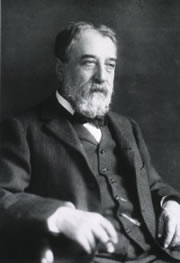This article is part of the series "A Moment in History" where we honor those who have contributed to the growth of medical knowledge in the areas of anatomy, medicine, surgery, and medical research.To search all the articles in this series, click here. |
|
|
Henry Koplik, MD (1858 -1927). American pediatrician and researcher, was born in 1858 in the city of New York. He received his MD from the College of Physicians and Surgeons at the Colombia University in New York. He spent several years studying in Berlin, Vienna, and Prague. Upon his return to the US he worked at the lower Manhattan Good Samaritan dispensary, where he later built a large pediatric outpatient clinic which became a model for the care of infants and children. In fact, under Dr Koplik's direction, this clinic became the world's first "milk depot" providing fresh milk and infant food for underprivileged mothers in the area. Dr. Koplik was one of the founders of the American Pediatric Society, and was one of its presidents. Mostly remembered by the pathognomonic and eponymic "Koplik's spots", Dr Koplik had many other achievements. Some of them include the prophylaxis of a milk depot, the strict discipline in diagnosis and care of the pediatric patient, the discovery of the bacillus responsible for whooping cough, the prevention of cross-contamination at a pediatric ward, etc. Dr. Koplik wrote a number of clinical and research papers on hygiene and public health, as well on a number of medical topics, plus a book on "Diseases of Infancy and Childhood". Sources: |
|
| Back to MTD Main Page | Subscribe to MTD |
